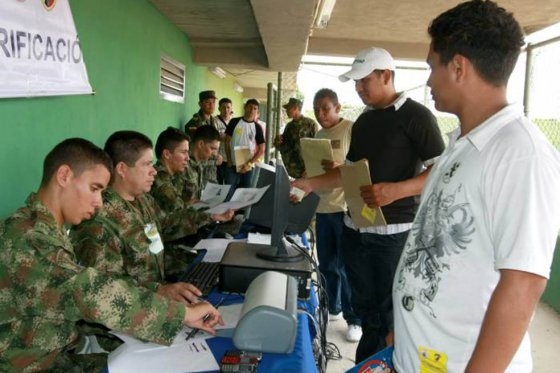Colombia: Clear way for conscientious objection

In a landmark ruling, the Constitutional Court ordered the army to recognize and resolve these requests in fifteen days. At the same time, the so-called "raids" of young people and leading them to military districts were strictly banned.
A transcendental judgement for the country's young people has just reached the Constitutional Court. This is perhaps the most important thing that this high court has uttered in its history on the prohibition of the so-called "raids" and recognition of the conscientious objection to compulsory military service.
As of today, Army recruitment authorities may not "advance, authorize, sort, or allow roundups or indiscriminate raids, aimed to identify citizens who have not resolved their military situation, with the aim of leading them to military units or other concentration sites, to provide military service," said the Constitutional Court. They should also resolve and recognize the requests of conscientious objection to military service, with no excuses of any kind. Otherwise, they be investigated and face disciplinary sanctions.
In sentence T-455 of 2014, 48 pages, the Court reviewed the case of two young conscientious objectors. One of them recruited after a military Army raid in a Medellin bus stop. The Ombudsman's Office has asked the High Court to review these cases, because far from being isolated, they represented the reality of hundreds of young Colombians who were violating their rights in the procedures for defining their military status.
That is why the Constitutional Court accepted the request, it made young people right and clarified the gaps and legal aspects so that recruitment authorities do not continue interpreting the jurisprudence as they see fit, as had been happening. For example, in the face of the avalanche of complaints that there are on young people who were not remiss and were arrested in trucks, driven to military districts and quartered, the Army authorities were taking refuge behind the fact that the Court had declared action to compel them as constitutional (compel someone, by force or authority, to do what they don't want).
However, they failed to explain that Judgement 879 of 2011 was also clear in saying that "the only understanding of this term is that anyone who has not fulfilled their obligation to register to define their military situation, may only be held momentarily while their situation is verified and they register, a process that requires no formalism and runs out precisely with the enrolment. Therefore, it cannot implicate citizen conduct to barracks or military districts".
A vacuum of interpretation for the Office of the Ombudsman was remedied with the latest judgement, as well as the one that existed in light of the right to conscientious objection to compulsory military service, since in its operative part, the Constitutional Court established the obligation to resolve these claims in 15 days, as if they were a right of petition. Nor can this motion be denied by arguing the absence of legal regulation.
A significant clarification, if it is understood that requests for conscientious objection tended to be archived or refused, arguing that there was no law that covered them, because Congress never took a bill forward. What is more, now, the Court says it is up to the Army to show if the person who objects awareness and presents their arguments meets or does not meet the conditions to credit this condition. That is to say, it is the recruitment authorities that have the burden of proof, as the lawyers say, and must, therefore, "indicate the full, precise and specific reasons behind that decision," says the document.
The Court also made it clear in this judgement that the person can ask to be exempt from military service on conscientious objection at any time, before or after the registration, or even once having been quartered. That is why the Army was also ordered to publish a fact sheet, explaining at least the grounds for exemption to compulsory military service required by law, including conscientious objection, and legal mechanisms that exist for not providing service. This fact sheet must be delivered to each and every citizen who initiate the registration process.
Similarly, the internet portal of the Head of recruitment of the National Army shall include a link to the electronic version and updated version of this fact sheet. Finally, the army must send in six months, a detailed report on the enforcement of the orders described.
Without doubt, this Court judgement responds to the call from last year from social organizations, councillors, members of congress and even the mayor of the capital city, Gustavo Petro, so that young people's rights, especially the poorest, are not violated in the recruitment procedures by the Army, in their eagerness to comply with legal fees imposed on them.
Recently there was a strong shakeup in the leadership of army recruitment that may respond to this need of reforms that put an end to the raids and recognize conscientious objection as a fundamental right. It is General Jorge Eliecer Suarez, head of the unit, who has the challenge to comply with the orders of the Constitutional Court and change history.
Translation: Paul Rankin
Source: El Espectador
Photo: La Corte Constitucional aclaró los procedimientos de reclutamiento y reiteró que las batidas son ilegales. / El Espectador Archivo
Related content
Countering Military Recruitment

WRI's new booklet, Countering Military Recruitment: Learning the lessons of counter-recruitment campaigns internationally, is out now. The booklet includes examples of campaigning against youth militarisation across different countries with the contribution of grassroot activists.
You can order a paperback version here.







